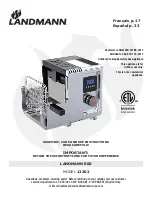
42
ENGLISH
WARNING: To reduce the risk of
serious personal injury, turn tool
off and disconnect battery pack
before making any adjustments or
removing/installing attachments or
accessories.
An accidental start-up
can cause injury.
The charger and battery pack are not serviceable.
There are no serviceable parts inside.
Lubrication
Your power tool requires no additional lubrication.
Cleaning
WARNING:
Blow dirt and dust out of
the main housing with dry air as often as
dirt is seen collecting in and around the
air vents. Wear approved eye protection
and approved dust mask when
performing this procedure.
WARNING:
Never use solvents or
other harsh chemicals for cleaning the
non-metallic parts of the tool. These
chemicals may weaken the materials
used in these parts. Use a cloth
dampened only with water and mild
soap. Never let any liquid get inside the
tool; never immerse any part of the tool
into a liquid.
CHARGER CLEANING INSTRUCTIONS
WARNING:
Shock hazard. Disconnect
the charger from the AC outlet before
cleaning. Dirt and grease may be
removed from the exterior of the charger
using a cloth or soft non-metallic brush.
Do not use water or any cleaning
solutions.
Optional Accessories
WARNING:
Since accessories, other
than those offered by D
E
WALT, have
not been tested with this product, use
of such accessories with this tool could
be hazardous. To reduce the risk of
injury, only D
E
WALT recommended
accessories should be used with this
product.
6. Keep the motor running when pulling the bit
back out of a drilled hole. This will help prevent
jamming.
Screwdriver Operation (fi g. 3)
1. Select the desired speed/torque range using
the three-speed gear shifter (f) on the top of the
tool. If using the torque adjustment collar (e),
initially set the three-speed gear shifter to speed
2 or 3. This ensures control over the fastener
and allows the screw to be set to specification.
NOTE:
Use the lowest torque setting (1) first
and increase the number through to the highest
setting (11) to seat the fastener at the desired
depth. The lower the number, the lower the
torque output.
2. Reset the torque adjustment collar (e) to the
appropriate number setting for the torque
desired. Make a few practice runs in scrap or
unseen areas to determine the proper position
of the torque adjustment collar.
NOTE:
The torque adjustment collar may be set to
any number at any time.
Hammerdrill Operation (fi g. 5)
1. Select the desired speed/torque range using
the gear shifter to match the speed and torque
to the planned operation. Set the torque
adjustment collar (e) to the hammer symbol.
2. Select the high speed 3 setting by sliding the
gear shifter (f) back (away form the chuck).
3. When drilling, use just enough force on the
hammer to keep it from bouncing excessively.
Prolonged and too much force on the hammer
will cause slower drilling speeds and potential
overheating.
4. Drill straight, keeping the bit at a right angle to
the work. Do not exert side pressure on the bit
when drilling as this will cause clogging of the
bit flutes and a slower drilling speed.
5. When drilling deep holes, if the hammer speed
starts to drop off, pull the bit partially out of
the hole with the tool still running to help clear
debris from the hole.
6. For masonry, use carbide-tipped bits or
masonry bits. A smooth, even flow of dust
indicates the proper drilling rate.
MAINTENANCE
Your D
E
WALT power tool has been designed to
operate over a long period of time with a minimum
of maintenance. Continuous satisfactory operation
depends upon proper tool care and regular cleaning.
















































